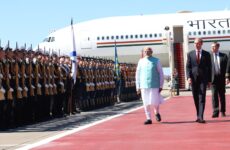New Delhi, China has stated it intent to substantially elevate its ties during the upcoming visit to India of its President Xi Jinping, disallowing differences in perception of the border to cloud a growing relationship of global significance.
In carefully chosen words, Liu Jianchao, Assistant Foreign Minister told visiting Indian journalists, that next week’s visit by President Xi would mark the beginning of “another era” of Sino-Indian ties, embedded with strong “strategic” resonance.
Several Chinese analysts are of the view that the United States’ Pivot to Asia—which is broadly visualised as a China containment doctrine— has, in response, triggered greater possibilities for stronger partnerships between Beijing and some of the regional heavyweights, including Russia and India. “Imagine the contribution it would make to human civilization if China and India began to work together for the development and progress of 2.5 billion people,” observed Mr. Liu. He noted, in response to a question that Beijing was open to exploring the possibility with Moscow of linking India with the $ 400 billion mega- energy tie up that China had recently signed with Russia.
Hectic preparations are underway for the Chinese President’s visit, which will take him first to Ahmedabad, prior to his departure to New Delhi on the same day. Ajit Doval, the National Security Adviser to Prime Minister Narendra Modi, called on President Xi on Tuesday afternoon, after concluding a meeting on Monday with Chinese foreign minister Wang Yi. Xinhua quoted Mr. Wang as saying that China was ready to cooperate with India in properly handling the border issue and elevate the strategic cooperative partnership to a new level. On his part, Mr. Doval stressed that it was time that India and China sent a clear signal to the world that the phase of Sino-Indian animosity was behind them, by enhancing comprehensive cooperation, maintaining peace and tranquility at border areas, and working together for a more fair and reasonable international order.
The Chinese have taken Mr. Modi’s high profile visit to Japan, in their stride, assured that it would not cast a shadow on Mr. Xi’s much anticipated “historic visit” to India. International cooperation, Mr. Liu observed, was not a “zero sum game,” adding that China was confident of competing with Tokyo for economic projects in India. Earlier, an editorial on Mr. Modi’s visit to Japan, in the Chinese communist party affiliated Global Times noted that India “has proved it is a rational country, displaying an independent foreign policy and loathing being an appendix of any particular power”.
India and China were also exploring joint forays in railways and setting up industrial parks in Maharashtra and Gujarat, with a Chinese investment exceeding $5 billion. Mr. Liu said that China was looking at possible participation in upgrading India’s existing railway network, building railway stations and establishing a railway academy for training personnel. Besides, construction of high speed railways was a top area of common interest.
Ahead of his arrival to India, Mr. Xi will visit Maldives—the first visit by a Chinese President to the island nation, as well as Sri Lanka. Xinhua quoted a Chinese official as saying that the visit will advance the development of the Silk Road Economic Belt and the Maritime Silk Road of the 21st Century.




 Driving Naari Programme launched in Chandigarh
Driving Naari Programme launched in Chandigarh






























